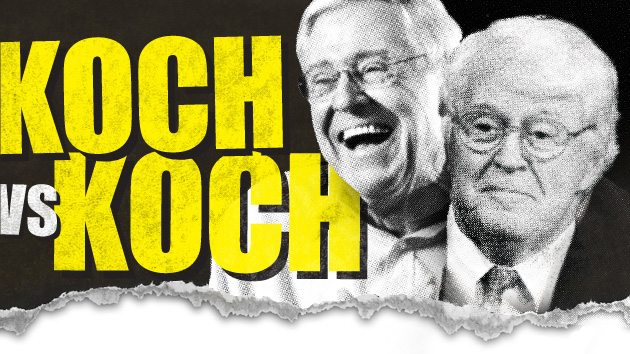
Bo Rader/TNS/ZUMA; Sonia Moskowitz/Globe Photos/ZUMA
Koch Industries has officially entered the contentious fight over the fate of the Export-Import Bank, the independent government agency that guarantees loans and provides financing to companies doing business overseas and foreign businesses buying American products—and that has recently become a target for conservatives and libertarians who decry big-government crony capitalism.
On Tuesday, the industrial conglomerate run by billionaire brothers Charles and David Koch sent a letter to Congress urging lawmakers to oppose the reauthorization of this obscure, 80-year-old institution, which otherwise will expire at the end of June. Signed by Philip Ellender, the president of Koch’s government affairs arm, the letter signals the start of a Koch lobbying effort aimed at shuttering the New Deal-era agency. The Ex-Im Bank has been living on borrowed time since September, when Congress temporarily extended its charter. But now Koch Industries wants Congress to eradicate the agency for good.
“The Ex-Im Bank is yet another example of the government intervening in the market to pick winners and losers,” Ellender writes. “It confers benefits granted by the American people as a whole to a small number of well-connected corporations. It socializes the risk of economic activity while benefiting relatively few companies.” (Read the full letter below.)
Since last summer, the bank has been under assault by conservatives who say the little-known credit agency doles out “corporate welfare” to major corporations, including Boeing, while leaving taxpayers on the hook for loans that private lenders deem too risky to underwrite. (Not only conservatives have slammed the Ex-Im Bank. Shortly before he was elected in 2008, Barack Obama called the bank “little more than a fund for corporate welfare,” but as president he has supported the agency.)
The battle has created a rare fight between some Republicans and the business community, including powerful trade groups such as the US Chamber of Commerce and the National Association of Manufacturers, which strongly support keeping the Ex-Im Bank alive. Eliminating the bank, supporters argue, will cost the nation thousands of jobs and hinder the ability of US companies to compete overseas.
In the past, Georgia Pacific, which is owned by Koch Industries, has taken part in deals made possible by Ex-Im Bank financing. Georgia Pacific has “engaged in a small number of transactions” involving the Ex-Im Bank, “not as a direct borrower” but as a result of deals with foreign companies that received Ex-Im financing, Ellender tells Mother Jones.
It’s not surprising that Koch Industries would part with the business community on this issue and side with the tea party and libertarian wings of the GOP that ardently desire the extinction of the Ex-Im Bank. Charles Koch, whose funding and strategic planning during the 1960s and 1970s helped expand the libertarian movement, has long opposed government interference in the marketplace. He has especially denounced subsidies (though his company will make use of them to remain competitive), bailouts, and corporate handouts. He believes that accepting government perks causes companies to subjugate themselves to government regulation, and he worries that free-market advocates in the corporate world appear hypocritical when they oppose the social safety net for people but seek government benefits for their firms. “How discrediting it is for us to request welfare for ourselves while attacking welfare for the poor,” Koch wrote in a 1978 call to arms to the business community. “Our critics rightfully claim that we want socialism only for the rich.” In the same article, he called the GOP “the party of ‘business’ in the wors[t] sense.”
Despite his best efforts, Koch’s crusade against “corporate welfare” didn’t catch on several decades ago. But as the Koch brothers have slowly gained influence within the Republican Party—ultimately establishing what amounts to a shadow party of their own within the GOP—there’s evidence that Charles Koch’s libertarian philosophy is taking root, and there’s no better example of that than the Ex-Im Bank fight. A constellation of groups backed by the brothers, including Americans for Prosperity, have been organizing to eradicate the Ex-Im Bank for months. “I would not say it’s coordinated—not at all,” Ellender says when asked how closely Koch Industries has been working with the advocacy groups and think tanks leading the Ex-Im Bank fight. He says Koch’s effort to shutter the outfit is “part of a macro strategy to eliminate subsidies, mandates, and government-created market distortions where they exist.”
Why did the Kochs and their allies single out an agency most Americans have never heard of? “Ex-Im represents both a policy and political target because it’s doable,” Diane Katz, a fellow at the Heritage Foundation, which has been at the forefront of the anti-Ex-Im campaign, told Bloomberg. “We’re not trying to take down the Federal Reserve here. We’re starting with an agency that is ripe.”
The key word is starting. This is part of a larger effort that Richard Fink, Charles Koch’s longtime political adviser, outlined in an interview with the Wichita Eagle shortly before the 2012 election:
The Kochs aren’t finished. Win or lose in November, they plan to start a new fight. They are organizing dozens of business and grassroots groups to build support for eliminating all corporate and agricultural subsidies.
The country must deal with corporate welfare, which they say exceeds $350 billion a year, before it can rein in spending on Social Security and Medicare, Fink said.
“How is any American going to feel good about reforming Medicare, Medicaid and Social Security when there is so much cronyism going on with these companies and businessmen are making off with so many tax dollars?” Fink asked.
There are powerful interests on both sides of the Ex-Im fight, and it remains unclear whether the embattled bank will win another last-minute reprieve. But the letter from Koch Industries and its accompanying lobbying campaign may help sway reticent Republicans seeking backing—or fearing opposition—from the Kochs’ deep-pocketed network of donors and advocacy groups. Bank opponents already have key allies on Capitol Hill, including Senate Majority Leader Mitch McConnell (R-Ky.) and Rep. Jeb Hensarling (R-Texas), chairman of the House financial services committee, which has oversight of the Ex-Im Bank. Bills to reauthorize the Ex-Im have been circulating through the House, though Hensarling could block them from coming to a vote before his committee.
“Ultimately, I think we will prevail,” says Ellender
The Ex-Im Bank has emerged as a conservative litmus test for the GOP’s crop of would-be presidential contenders. At a conference organized by the conservative Club for Growth late last month, Wisconsin Gov. Scott Walker and former Florida Gov. Jeb Bush urged the bank be eliminated. Sens. Ted Cruz (R-Texas), Marco Rubio (R-Fla.), and Rand Paul (R-Ky.) have also called for its charter to expire.
The Koch letter and the company’s behind-the-scenes lobbying will undoubtedly help to elevate the issue within the Republican Party. “We’re not looking for credit,” Ellender says. But he adds, “I would indeed hope we have had an impact on the debate.”













